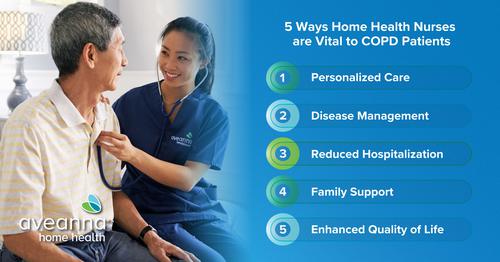Chronic obstructive pulmonary disease (COPD) is a progressive lung disease that makes it difficult to breathe. Symptoms of COPD can include shortness of breath, coughing, and wheezing. COPD can be managed with medication, lifestyle changes, and home health care.

Physical changes associated with COPD can impact your ability to engage in activities that you enjoy as well as affect your mood and emotional health. But Aveanna Home Health Care clinicians can provide crucial support to help you navigate ongoing physical challenges and caregiving burdens. Here are 5 reasons why home health care clinicians are essential for people with COPD who may be discharged from a hospital or skilled nursing facility.
-
Personalized Care: Home health care clinicians offer tailored interventions that address each patient’s individual needs. This encompasses taking the right medicines at the right time, monitoring and improving oxygen levels with monitoring and improving oxygen levels daily activities, and understanding when and how to use breathing treatments.
-
Condition Management: COPD necessitates ongoing symptom management that fits into your daily routine. Home health care clinicians can educate patients and loved ones on effective self-care techniques, including healthier eating, breathing exercises, and necessary lifestyle adjustments. A home health care clinician, for example, can teach a COPD patient when and how to conduct pursed-lip breathing and other simple techniques that make it easier to breathe and perform daily activities.
-
Reduced visits to the emergency department and Hospitalizations: Home health care clinicians help you identify and know what actions to take with potential complications, thereby diminishing the necessity for hospitalizations and emergency room visits. For example, home health care nurses and therapists can help you learn how to monitor oxygen levels, understand what to do in case of changes, or notify the doctor if levels go below physician-ordered ranges/parameters.
-
Family Support: Home health care clinicians extend support and personalized education to family members, enabling them to effectively partner with their loved one to manage symptoms, reduce stress levels, and improve communication. For example, a home health care clinician can teach a family member or informal caregiver how to perform chest percussion, which helps loosen and expel mucus, making it easier to breathe.
-
Enhanced Quality of Life: Through the assistance of home health care clinicians, people with COPD can maintain their independence within the comfort of their own homes. For example, a home health care therapist can help set up a home activity routine that improves functional mobility, symptom management, and quality of life.
If you or a loved one is living with COPD, it is worth considering the benefits of home health care. Home health care nurses and therapists can provide personalized care and condition management that help improve family support and quality of life while reducing unnecessary hospitalizations. Let us partner to make living with COPD more manageable.
To learn more about how home health care can help you or your loved one with COPD, please contact Aveanna Home Health today.
Disclaimer: The information provided in this blog post is for general informational purposes only. Always consult with your physician or qualified healthcare professional before implementing any tips or recommendations mentioned here.